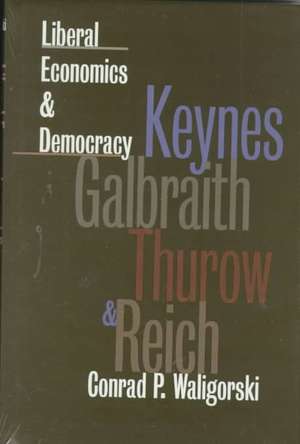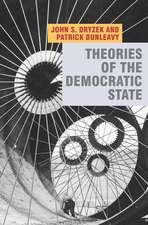Liberal Economics & Democracy: American Political Thought (University Press of Kansas)
Autor Conrad P. Waligorskien Limba Engleză Hardback – 31 dec 1996
Waligorski argues that, despite individual differences, these economists are bound together by a common vision of the public good. Collectively, these thinkers represent a strong counter tradition to the laissez-faire, free-market philosophy of James Buchanan, Milton Friedman, F. A. Hayek, Newt Gingrich, and other proponents of minimalist government and "trickle-down economics."
Contrary to such critics, liberal economists advocate government regulation as a guard against the power of the marketplace to erode our most cherished political values and social institutions. For these economists, a completely free market is definitely not the best market for democracy; an unrestrained market guarantees neither fairness nor prosperity and in Keynes' time nearly destroyed our nation.
Waligorski locates the roots of their tradition in the thought exemplified by American Progressives John Dewey and Louis Brandeis and British liberal L. T. Hobhouse. But he also shows that these economists are no ivory tower theorists, that they are genuinely engaged with real-world problems and politics. Indeed, all of these theorists have written for a broad public in an effort to influence public policy and all have been political activists and/or advisors at various points in their careers.
A fitting sequel and companion to Waligorski's last book, "The Political Theory of Conservative Economists," this new work provides a provocative challenge to the relentless conservative and libertarian attacks on the regulatory welfare state. Certainly, few debates will be more closely watched in this presidential election year.
Din seria American Political Thought (University Press of Kansas)
-
 Preț: 394.32 lei
Preț: 394.32 lei -
 Preț: 440.84 lei
Preț: 440.84 lei -
 Preț: 245.35 lei
Preț: 245.35 lei -
 Preț: 241.88 lei
Preț: 241.88 lei -
 Preț: 397.41 lei
Preț: 397.41 lei -
 Preț: 242.47 lei
Preț: 242.47 lei -
 Preț: 241.49 lei
Preț: 241.49 lei -
 Preț: 246.33 lei
Preț: 246.33 lei -
 Preț: 399.15 lei
Preț: 399.15 lei - 15%
 Preț: 435.54 lei
Preț: 435.54 lei -
 Preț: 197.46 lei
Preț: 197.46 lei -
 Preț: 199.96 lei
Preț: 199.96 lei -
 Preț: 392.99 lei
Preț: 392.99 lei -
 Preț: 213.58 lei
Preț: 213.58 lei -
 Preț: 392.41 lei
Preț: 392.41 lei -
 Preț: 438.93 lei
Preț: 438.93 lei -
 Preț: 202.09 lei
Preț: 202.09 lei -
 Preț: 196.91 lei
Preț: 196.91 lei -
 Preț: 264.39 lei
Preț: 264.39 lei -
 Preț: 240.56 lei
Preț: 240.56 lei -
 Preț: 396.65 lei
Preț: 396.65 lei -
 Preț: 400.08 lei
Preț: 400.08 lei -
 Preț: 263.46 lei
Preț: 263.46 lei -
 Preț: 222.92 lei
Preț: 222.92 lei -
 Preț: 269.01 lei
Preț: 269.01 lei -
 Preț: 486.60 lei
Preț: 486.60 lei -
 Preț: 441.61 lei
Preț: 441.61 lei -
 Preț: 240.56 lei
Preț: 240.56 lei -
 Preț: 220.03 lei
Preț: 220.03 lei -
 Preț: 196.32 lei
Preț: 196.32 lei -
 Preț: 199.58 lei
Preț: 199.58 lei -
 Preț: 265.37 lei
Preț: 265.37 lei -
 Preț: 396.65 lei
Preț: 396.65 lei -
 Preț: 438.17 lei
Preț: 438.17 lei -
 Preț: 397.19 lei
Preț: 397.19 lei -
 Preț: 200.18 lei
Preț: 200.18 lei -
 Preț: 238.99 lei
Preț: 238.99 lei -
 Preț: 217.44 lei
Preț: 217.44 lei -
 Preț: 320.10 lei
Preț: 320.10 lei -
 Preț: 398.39 lei
Preț: 398.39 lei -
 Preț: 440.08 lei
Preț: 440.08 lei -
 Preț: 398.18 lei
Preț: 398.18 lei
Preț: 400.30 lei
Nou
Puncte Express: 600
Preț estimativ în valută:
76.60€ • 79.82$ • 63.42£
76.60€ • 79.82$ • 63.42£
Carte tipărită la comandă
Livrare economică 03-17 aprilie
Preluare comenzi: 021 569.72.76
Specificații
ISBN-13: 9780700608034
ISBN-10: 0700608036
Pagini: 272
Dimensiuni: 162 x 237 x 28 mm
Greutate: 0.62 kg
Ediția:New.
Editura: University Press of Kansas
Seria American Political Thought (University Press of Kansas)
ISBN-10: 0700608036
Pagini: 272
Dimensiuni: 162 x 237 x 28 mm
Greutate: 0.62 kg
Ediția:New.
Editura: University Press of Kansas
Seria American Political Thought (University Press of Kansas)
Textul de pe ultima copertă
Conrad Waligorski argues that, despite individual differences, liberal economists are bound together by a common vision of the public good. Collectively, these thinkers represent a strong countertradition to the laissez-faire, free-market philosophy of James Buchanan, Milton Friedman, F. A. Hayek, Newt Gingrich, and other proponents of minimalist government and trickle-down economics. Waligorski locates the roots of the liberal economic tradition in the thought exemplified by U.S. Progressives John Dewey and Louis Brandeis, and by British liberal L. T. Hobhouse. But he also shows that these economists are no ivory-tower theorists, that they are actively engaged with real-life problems and politics. A fitting sequel and companion to Waligorski's last book, The Political Theory of Conservative Economists, this new work provides a provocative challenge to the relentless conservative and libertarian attacks on the regulatory welfare state.














